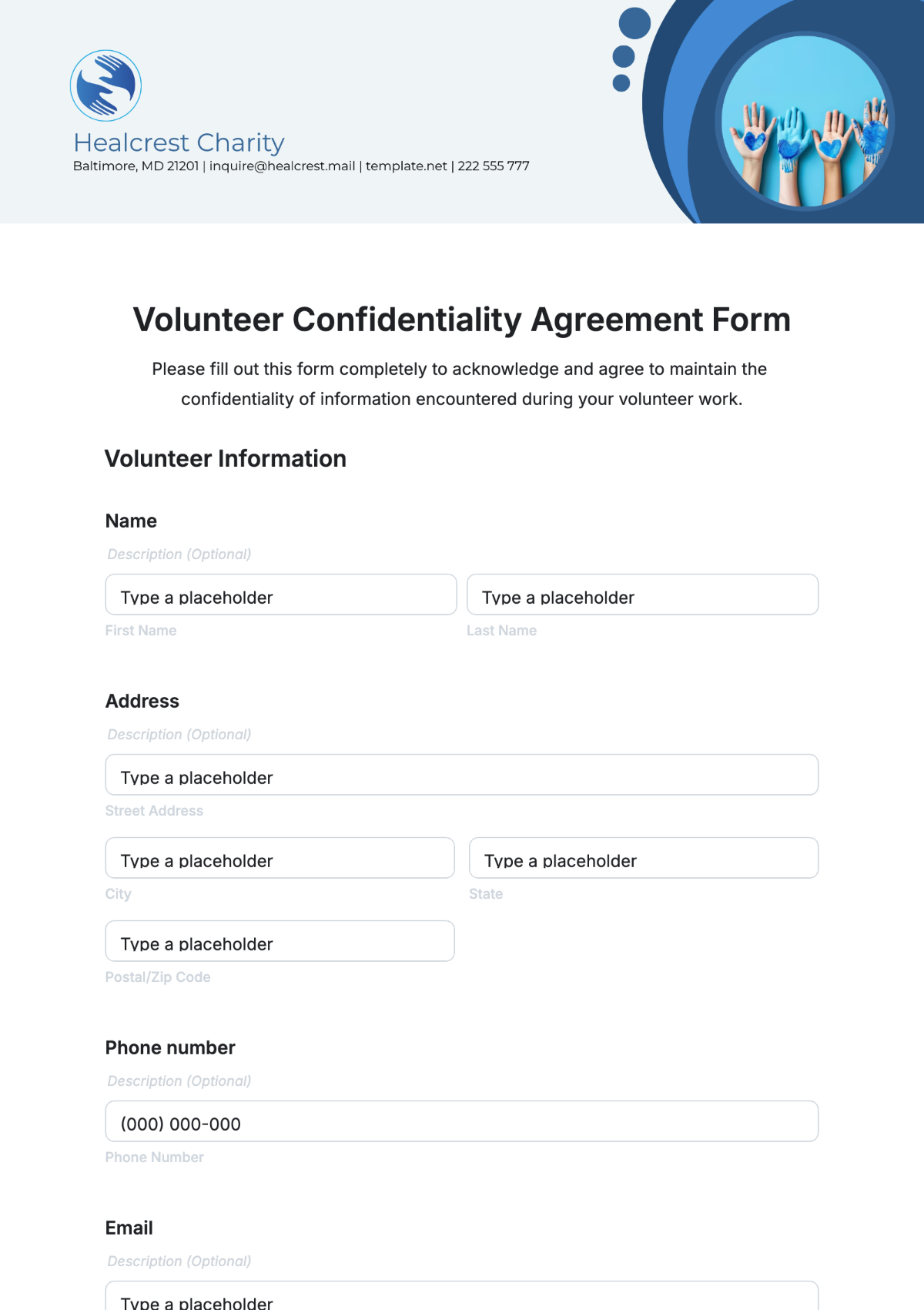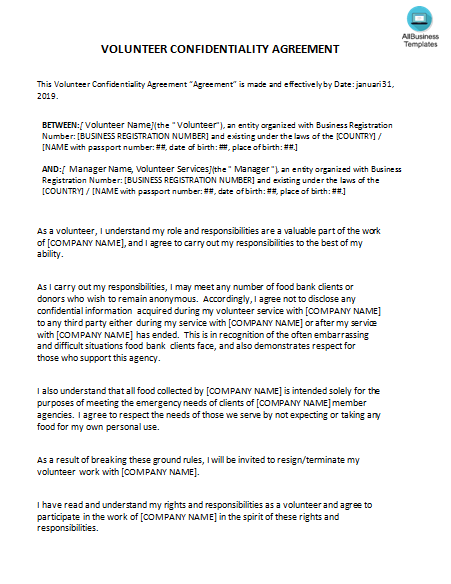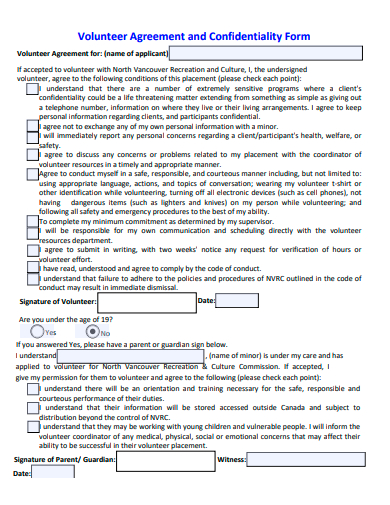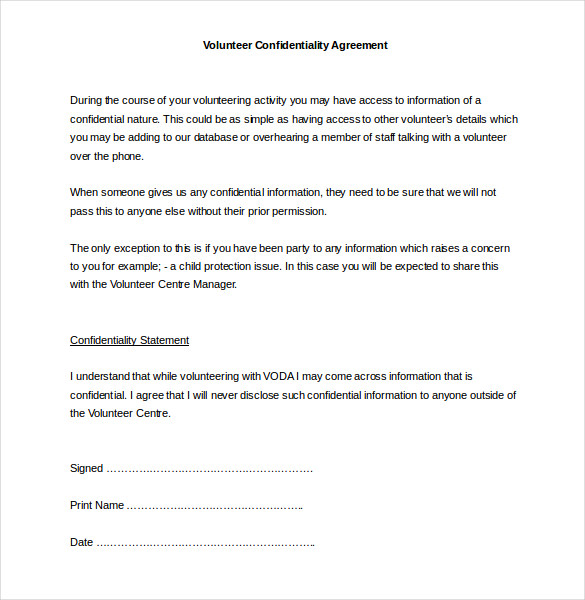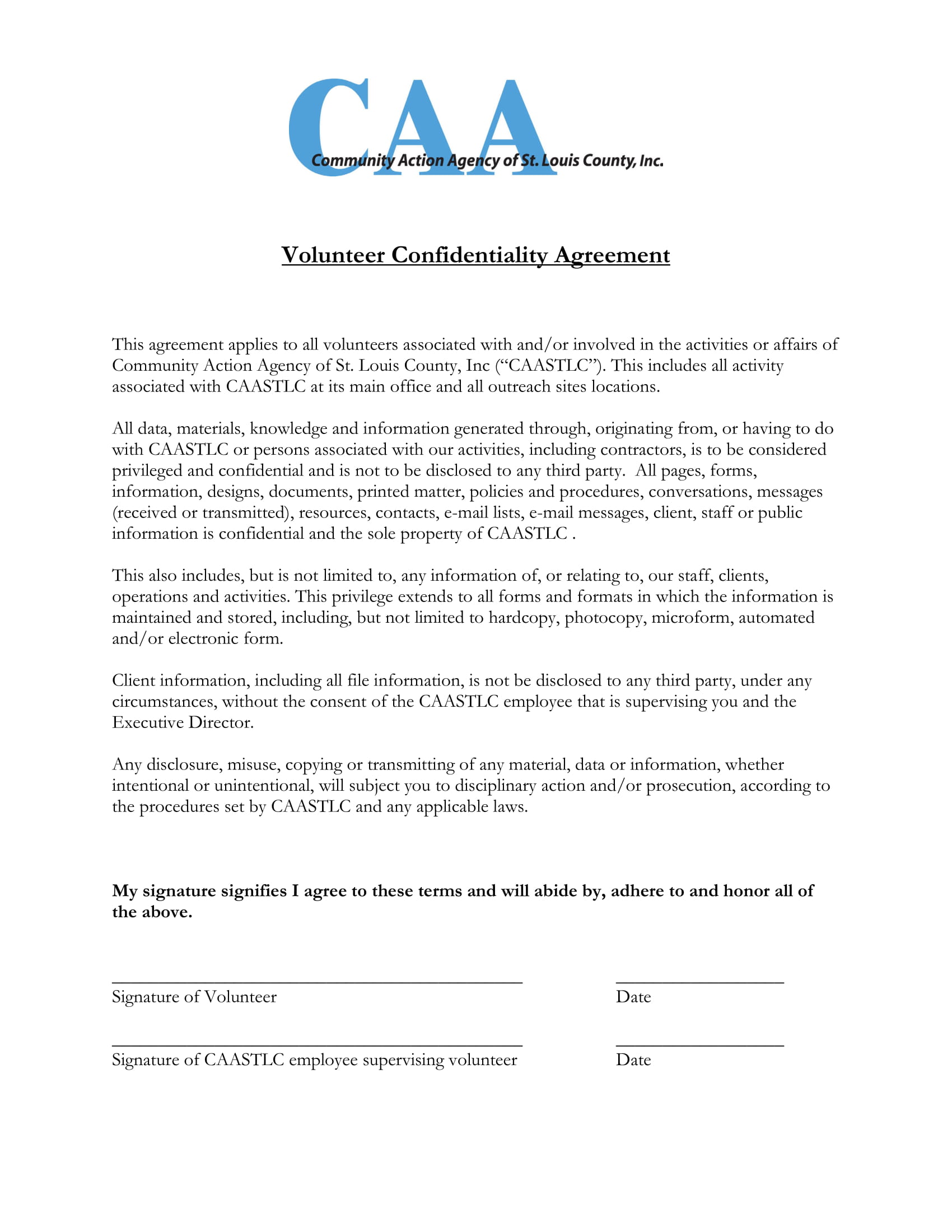The Volunteer Confidentiality Agreement Template You Need for Your Organization
In today’s world, organizations, from non-profits to businesses, rely heavily on the dedication and support of volunteers. These individuals contribute invaluable time and effort, often gaining access to sensitive information. This is where a Volunteer Confidentiality Agreement becomes critical. It’s not just a legal formality; it’s a crucial tool for protecting your organization’s data, reputation, and the trust placed in you. This article will guide you through the importance of a well-crafted template, what it should include, and how to implement it effectively.
Why Your Organization Needs a Volunteer Confidentiality Agreement
Think of your organization’s sensitive information: client data, financial records, internal strategies, and proprietary information. Without a confidentiality agreement, this valuable data is vulnerable. A volunteer, though well-intentioned, may inadvertently or intentionally disclose confidential information, leading to serious consequences.
Here’s why a Volunteer Confidentiality Agreement is non-negotiable:
- Protection of Sensitive Information: Safeguards confidential data, trade secrets, and proprietary information from unauthorized disclosure.
- Legal Compliance: Helps your organization comply with relevant privacy laws and regulations (e.g., GDPR, HIPAA, etc.).
- Enhanced Trust and Reputation: Demonstrates your commitment to protecting sensitive information, building trust with clients, donors, and stakeholders.
- Risk Mitigation: Reduces the risk of financial loss, reputational damage, and legal liabilities associated with data breaches.
- Clear Expectations: Sets clear boundaries and expectations for volunteers regarding the handling of confidential information.
Key Elements of a Comprehensive Volunteer Confidentiality Agreement Template
A well-structured template is your foundation. Here are the essential elements your agreement should include:
- Identification of Parties: Clearly identify the organization and the volunteer.
- Definition of Confidential Information: Provide a detailed definition of what constitutes confidential information. This should be broad enough to cover all relevant data. Examples include:
- Client/Patient Information (names, addresses, medical history, etc.)
- Financial Data (budgets, financial statements, fundraising strategies)
- Internal Communications (meeting minutes, emails, memos)
- Proprietary Information (trade secrets, processes, formulas)
- Obligations of the Volunteer: Outline the volunteer’s responsibilities, including:
- Maintaining confidentiality during and after their volunteer service.
- Not disclosing confidential information to third parties.
- Using confidential information only for authorized purposes.
- Properly storing and protecting confidential information.
- Returning or destroying confidential information upon termination of their volunteer service.
- Duration of Confidentiality: Specify the period for which the volunteer must maintain confidentiality (e.g., indefinitely, or for a specific period after their volunteer service ends).
- Permitted Uses: Clearly state what uses of confidential information are permissible.
- Exceptions to Confidentiality: Outline any exceptions, such as disclosures required by law or court order.
- Consequences of Breach: Describe the potential consequences of violating the agreement, which may include:
- Termination of volunteer service.
- Legal action for damages.
- Reporting to relevant authorities.
- Governing Law and Jurisdiction: Specify the state or jurisdiction whose laws will govern the agreement.
- Signature and Date: Provide space for the volunteer and an authorized representative of the organization to sign and date the agreement.
Customizing Your Template for Different Volunteer Roles
While a general template is a good starting point, tailoring it to specific volunteer roles can further strengthen your protection. Consider these factors:
- Level of Access: Volunteers with access to highly sensitive information (e.g., financial records, medical data) require a more stringent agreement.
- Specific Duties: Tailor the definition of “confidential information” to the specific tasks the volunteer will perform.
- Training and Education: Provide thorough training on confidentiality policies and procedures to all volunteers.
- Regular Review: Update your template periodically to reflect changes in laws, regulations, and organizational practices.
Implementing and Enforcing the Agreement
Simply having a template isn’t enough. Effective implementation and enforcement are key:
- Provide the Agreement: Present the agreement to volunteers before they begin their service and obtain their signature.
- Explain the Agreement: Clearly explain the terms of the agreement to each volunteer and answer any questions they may have.
- Maintain Records: Keep a signed copy of the agreement on file for each volunteer.
- Training: Provide regular training on confidentiality and data security best practices.
- Enforcement: Take swift and decisive action if a breach occurs, as outlined in the agreement.
Conclusion: Secure Your Organization’s Future
A Volunteer Confidentiality Agreement is an essential tool for any organization that relies on volunteers. By implementing a well-crafted agreement, you protect your sensitive information, build trust, and mitigate risks. Don’t wait until a breach occurs; proactively safeguard your organization’s future by creating and enforcing a robust confidentiality agreement today.
Frequently Asked Questions (FAQs)
1. Is a Volunteer Confidentiality Agreement legally binding?
Yes, a properly drafted and executed agreement is generally legally binding. However, its enforceability depends on various factors, including the specific terms of the agreement and the applicable laws of the jurisdiction.
2. How long should the confidentiality obligations last?
The duration of confidentiality obligations should be clearly stated in the agreement. It can vary depending on the type of information and the organization’s needs. Often, it is a specific period after the volunteer’s service ends or indefinitely.
3. What if a volunteer refuses to sign the agreement?
If a volunteer refuses to sign the agreement, you should not allow them to access any confidential information. You may need to reconsider their volunteer role or find an alternative that does not involve access to sensitive data.
4. Do I need a lawyer to create a Volunteer Confidentiality Agreement?
While you can find templates online, it’s highly recommended that you consult with an attorney to ensure your agreement is legally sound and tailored to your organization’s specific needs and the laws of your jurisdiction.
5. Can the agreement be modified after it’s signed?
Generally, the agreement should not be modified after it’s signed. However, with the agreement of both parties, amendments can be added in writing. It’s best to have a new agreement signed if significant changes are needed.
